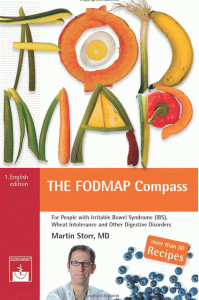 The Low FODMAP diet is the worldwide standard for controlling digestive problems and symptoms associated with irritable bowel syndrome (IBS), Crohn’s disease, ulcerative colitis, celiac disease, small bowel bacterial overgrowth (SIBO), food intolerance, gastroesophageal reflux disease (GERD) and many more. Martin Storr’s book The FODMAP Compass is a practical guide to implementing the low-FODMAP diet and controlling digestive problems.
FODMAPs are short chain carbohydrates and sugar alcohols that can cause symptoms such as flatulence, diarrhea, abdominal pain and many other digestive problems. All foods contain FODMAPs. The low FODMAP diet differentiates between high-FODMAP and low-FODMAP foods. Understanding the background of the diet concept is critical to a successful long-term implementation. The reader will learn to identify and limit foods with a high FODMAP content.
Customers say, „I love the clear idea of how small changes in standard meals helped me get rid of my symptoms“ and find Martin Storr’s book „a great reference book for anyone with IBS“. Among physicians and nutritionists, the tables, grocery lists and implementation strategies are strongly recommended. Whether you are a layman or a specialist, this book provides you with all the information you need to succeed in a low-FODMAP diet to regain your quality of life. More than 50 tasty recipes help to make the beginning of the diet a delicious one.
For more information on the new beginners guide to the low fodmap diet click here.
https://www.openpr.com/news/1228475.html
The Low FODMAP diet is the worldwide standard for controlling digestive problems and symptoms associated with irritable bowel syndrome (IBS), Crohn’s disease, ulcerative colitis, celiac disease, small bowel bacterial overgrowth (SIBO), food intolerance, gastroesophageal reflux disease (GERD) and many more. Martin Storr’s book The FODMAP Compass is a practical guide to implementing the low-FODMAP diet and controlling digestive problems.
FODMAPs are short chain carbohydrates and sugar alcohols that can cause symptoms such as flatulence, diarrhea, abdominal pain and many other digestive problems. All foods contain FODMAPs. The low FODMAP diet differentiates between high-FODMAP and low-FODMAP foods. Understanding the background of the diet concept is critical to a successful long-term implementation. The reader will learn to identify and limit foods with a high FODMAP content.
Customers say, „I love the clear idea of how small changes in standard meals helped me get rid of my symptoms“ and find Martin Storr’s book „a great reference book for anyone with IBS“. Among physicians and nutritionists, the tables, grocery lists and implementation strategies are strongly recommended. Whether you are a layman or a specialist, this book provides you with all the information you need to succeed in a low-FODMAP diet to regain your quality of life. More than 50 tasty recipes help to make the beginning of the diet a delicious one.
For more information on the new beginners guide to the low fodmap diet click here.
https://www.openpr.com/news/1228475.html
Hinweis an unsere Leser: Wir erstellen für Sie Informationsseiten. Die Informationen enthalten Affiliate links zu Amazon, in diesem Zusammenhang erhalten wir von Partnern eine Provision, sofern ein Kauf zustande kommt. Für Sie ändert sich dadurch nichts.
Dear Sir,
Your book is great, we have given copies to four of our friends.
We have a query that we hope you can resolve.
All rice products including rice milk are shown as low, as are almonds (with moderation).
Oat products are shown as low but oat milk as high. As presumedly oat milk is little more than crushed oats and water why is oat milk shown as high when rice milk and almond milk are shown as low?
My wife, who needs to avoid dairy products, is looking for an alternative to milk and would prefer oat milk but not if it is high. Your clarification would be most helpful.
As my wife can not cope with shop bread, I make our own with flour that contains 20% malted wheat flakes. My wife finds that she can cope with this bread. I did query why this is so with the miller (a local mill near to us in England) and he had view that the malt might help to lessen the effect of gluten. However, having reread you book you say that longer proving of the dough also helps to neutralize the effect of the gluten. I have always made the dough and allowed it to prove (usually 30minutes plus) before re-kneading it before making into loaves. It now seems I was doing what you suggested. Does however, the malt have an effect?
I look forward to hearing from you.
Regards,
J. A.
Dear John,
Malt and wheat or barley malt does not alter Gluten content or FODMAP content but malt is overall preferred over other sugars (according to lists low FODMAP).
Your preparation of the bread dough seems to do the job for your wife.
Congratulations.
Oat milk like the other non cow milks are industrially processed and sometimes fermented foods. They are very different amongst each other and one soy milk varies from the other soy milk and so on. So this very difficult to give a simple FODMAP judgement, even Monash has difficulties here.
From my perspective avoid such milks as much as possible.
General summary:
Soy Milk from beans FODMAP high, from protein FODMAP low
Almondmilk FODMAP low
Oatmilk FODMAP high
There are numerous products from soy, almond, oat, wheat, barley like flour, milk, bread, butter -meal, cake, yoghurt, cookies, bran, muffins and depending on who produces these, general FODMAP content varies.
Best
FODMAP Team